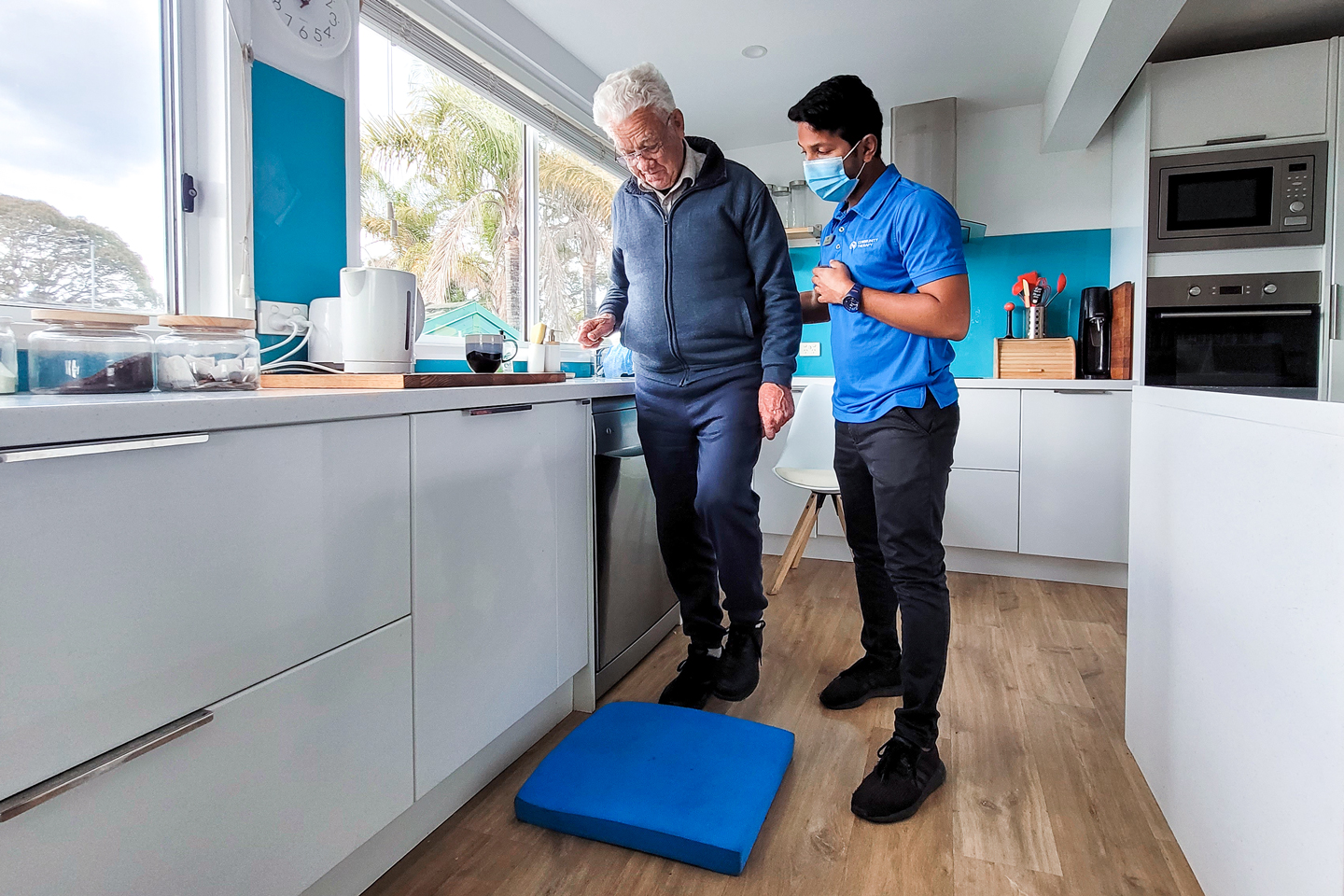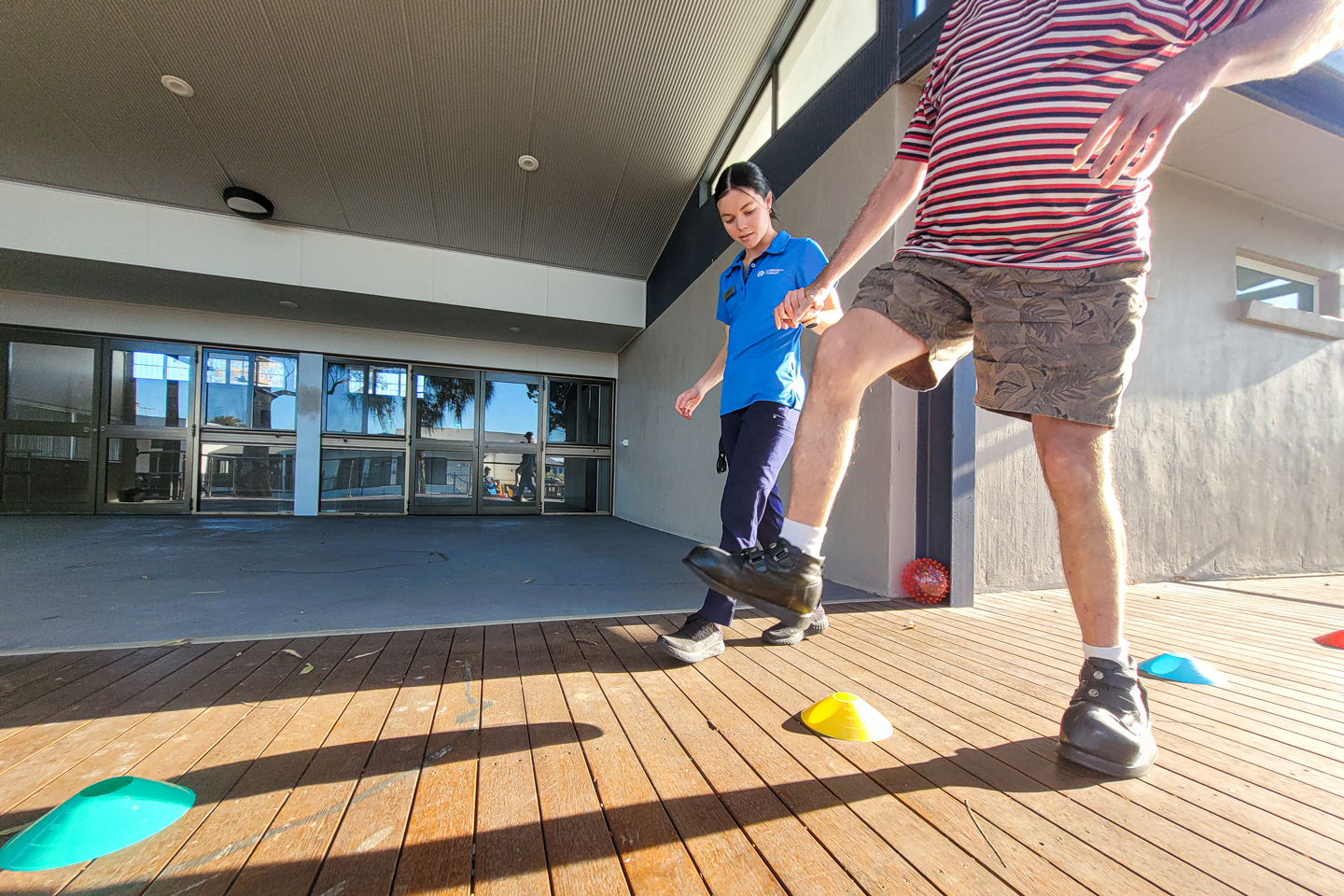Exercise Physiology Services
Community Therapy provides caring Exercise Physiology services to help individuals with different health conditions and disabilities.
Our services are mobile and conducted in people’s homes, or at community settings (i.e. parks and pools).
We work with peadiatric and adult clients in the Newcastle, Hunter and Central Coast regions.
A wonderful positive outcome of Exercise Physiology is to support people to engage in physical activity, hobbies and sports that they enjoy!

Personalised Service
This means really getting to know the people that we support.
We listen to how they would like to be supported and make little changes.
Flexible Scheduling
We listen to our clients and adjust our appointments to fit their schedules.
If they prefer afternoon visits over mornings, we will accommodate.
Gender Preference
We ensure our clients are matched with an exercise physiologist of their preferred gender,
This creates a comfortable and supportive environment for their care.
What to Expect from Exercise Physiology
Community Therapy actively listens to our client’s and their desired outcomes of engaging us. A person can expect to improve;
- Their physical abilities and;
- To work towards their goals
We support people to improve their physical abilities, such as strength, balance, flexibility and fitness.

Who We Support
At Community Therapy we are passionate about supporting older adults and people living with disabilities.
We work alongside approved aged care providers and NDIS providers to ensure timely access to Exercise Physiology services in our clients homes.
We visit people living in various living arrangements, from private homes, units, apartments, retirement villages, disability group homes and residential aged care facilities. We also see people in the community—at pools, beaches, parks, and gyms—using Exercise Physiology to promote community participation.
Our team loves working with people to help them move towards the meaningful goals that they have set and would like to achieve.

How Exercise Physiology Works
As mentioned, our services are mobile and take place in the community, either at a person’s home or community location (further reading: hydrotherapy).
Most of our EP sessions last between 30-45 minutes.
As a large Allied health provider, we have multiple Exercise Physiologists in our staff, and we will endeavour to ask questions and allocate a clinician that a person will benefit most from.
We aim for continuity of care, and under a NDIS or homecare plan, a person will often see the same clinician for weeks, months, or even years!

How Personalised Exercise Programs are Developed
An EP will work with you to create a personalised home exercise program that is safe and suitable for you to do at home, either on your own or with the support of a loved one ❤️ or caregiver.
Your EP will provide you with a copy of your home exercise program in a format of your preference, which is typically paper or a digital app.
Your personalised home exercise program is usually reviewed every 8 to 12 weeks. As your physical abilities improve, your program will need to be adjusted.

Creating Success Stories in the Community
We have so many wonderful stories of people that our EPs have been able to help.
One example is an NDIS participant who had previously suffered a stroke and had undergone Physiotherapy. They were ready to transition to Exercise Physiology for chronic and lifestyle management of their physical activity.
One of their main goals was to improve their ability to walk on the beach and swim.
Over several months, they worked with their exercise physiologist to improve strength, balance, and endurance, including practicing safe beach walks.
Eventually, they returned to swimming in the ocean baths!

Contact Community Therapy
Do you know someone who could be our next success story?
If you or a loved one would benefit from Exercise Physiology, we would like to hear from you!
- We are mobile across Newcastle, the Hunter, and Central Coast
- We provide services to paediatrics and adults
- We are an Australian owned and operated company
- Save time – we come to you!
Please use our contact page for any questions you may have!

FAQ
-
What boards are your Exercise Physiologists a member of?
Community Therapy Exercise Physiologists maintain certification with Exercise and Sports Science Australia (ESSA). This is a mandatory, yearly certification.
-
Do I see the same clinician or can it change?
Almost always, you will be seeing the same Exercise Physiologist. The exception to this would be times our clinicians are unwell or on leave.
-
Do we always meet at my residence or can we meet somewhere else?
Usually, your Exercise Physiologist will come to your home. However, our Exercise Physiologists conduct therapy at other locations such as gyms, pools or in the community.
-
In what ways are the Exercise Physiology sessions fun and engaging?
Yes!
At Community Therapy we are always conscious of making sessions not only evidence-based for success, but also fun and engaging as well.
The people we hire play a large role in this; we recruit Exercise Physiologists who are fun and interesting people. This goes a long way to ensuring that our clients have positive and uplifting experiences with us.
-
Can you describe your Exercise Physiology process in detail?
Please feel free to make your referral through our referral page or phone us on 1300 031 935.
The first stage of the process is to ensure that we’re the suitable provider to consider. Please note that we work best with adults (over 18) and our service areas are the greater Hunter, Central Coast and Port Stephens regions.
We will discuss the person’s medical conditions, current situation and goals they would like to achieve with Exercise Physiology.
—
A Exercise Physiologist from Community Therapy will see the person at their home to conduct an initial assessment. The assessment usually takes between 60-90 minutes to complete.
The initial assessment will involve communicating about the clinical (or NDIS) plan and any medical records relating to the person’s health conditions. We will begin to understand what goals the person wants to move towards, as well as the therapy that should be utilised.
—
After the initial assessment, the following sessions involve performing therapy sessions with your Exercise Physiologist.
The Exercise Physiologist will provide self-directed exercises that are safe for clients to complete, either independently or with the assistance of a family member, care staff or other.
—
The Exercise Physiologist will visit the client at an agreed frequency.
The frequency is typically weekly or fortnightly, however, some people may be reviewed at longer intervals, depending on their condition.
For our NDIS participants and home care clients, we provide comprehensive reports to inform your NDIS plan or home care plan of what has been achieved and what we are aiming to be achieved in the future.
-
What Our Exercise Physiologists Do
Our Exercise Physiologists are registered with Exercise and Sports Science Australia (ESSA). Our clinicians hold their own public and professional indemnity insurance, possess current criminal record checks, working with children checks, NDIS worker screening checks and required vaccinations.
Our Exercise Physiologists help people to live better and healthier lives with evidence based and engaging exercise therapy. We focus on helping people to achieve goals that are meaningful for them and ensure that our exercise programs are engaging!
We help people move better and feel better by improving all areas of their physical wellbeing such as their cardiovascular function (heart and lungs), strength, flexibility and balance.
Importantly, the link between physical and mental wellbeing is very clear and our exercise therapy programs are very focused on mental wellbeing and very appropriate for people living with psychosocial, learning and intellectual disabilities.

